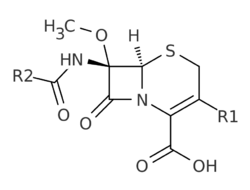Chemistry:Cephem


Cephems are a sub-group of β-lactam antibiotics including cephalosporins and cephamycins.[1] It is one of the most common 4-membered ring heterocycle.[2] Produced by actinomycetes, cephamycins were found to display antibacterial activity against a wide range of bacteria, including those resistant to penicillin and cephalosporins.[3] The antimicrobial properties of Cephem include the attachment to certain penicillin-binding proteins that are involved in the production of cell walls of bacteria.[4]
Research
Researchers have developed antibiotics that include cephems and they have tried to test them clinically. [5] Many of the antibiotics that are manufactured have different efficiencies based on the amount used, their strength, and their antibacterial spectra.[5] Research was conducted on drugs that contain cephem to investigate their pharmacokinetics in the exudate of the space behind the peritoneum after radical hysterectomy and pelvic lymphadenectomy. [5]
References
- ↑ "Chemical and microbiologic aspects of penems, a distinct class of beta-lactams: focus on faropenem". Pharmacotherapy 23 (11): 1497–1507. November 2003. doi:10.1592/phco.23.14.1497.31937. PMID 14620395.
- ↑ "Analysis of the structural diversity, substitution patterns, and frequency of nitrogen heterocycles among U.S. FDA approved pharmaceuticals". Journal of Medicinal Chemistry 57 (24): 10257–10274. December 2014. doi:10.1021/jm501100b. PMID 25255204.
- ↑ "Cephamycins, a new family of beta-lactam antibiotics. I. Production by actinomycetes, including Streptomyces lactamdurans sp. n". Antimicrobial Agents and Chemotherapy 2 (3): 122–131. September 1972. doi:10.1128/AAC.2.3.122. PMID 4790552.
- ↑ "Ab Initio Spectroscopic Investigation of Pharmacologically Relevant Chiral Molecules: The Cases of Avibactam, Cephems, and Idelalisib as Benchmarks for Antibiotics and Anticancer Drugs" (in en). Symmetry 13 (4): 601. 2021-04-03. doi:10.3390/sym13040601. ISSN 2073-8994. Bibcode: 2021Symm...13..601M.
- ↑ 5.0 5.1 5.2 "Pharmacokinetics of cephem antibiotics in exudate of pelvic retroperitoneal space after radical hysterectomy and pelvic lymphadenectomy". Antimicrobial Agents and Chemotherapy 34 (6): 1160–1164. June 1990. doi:10.1128/AAC.34.6.1160. PMID 2393276.
Further reading
- Bryskier, André (2000). "Cephems. Fifty Years of Continuous Research". The Journal of Antibiotics 53 (10): 1028–1037. doi:10.7164/antibiotics.53.1028. PMID 11132947.
 |
